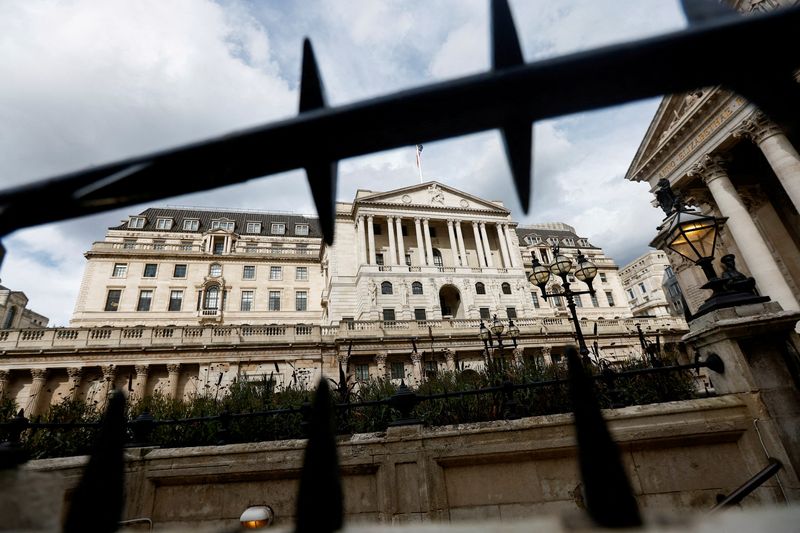By William Schomberg
LONDON (Reuters) - The Bank of England looks set to keep its cards close to its chest on Thursday and not speed up its progress towards cutting interest rates, as it awaits clearer signs that the country's hot inflation problem has been doused.
The BoE is widely expected to keep Bank Rate at 5.25%, its highest level since 2008, in its March policy announcement at 1200 GMT, a day after data showed inflation fell to its lowest in almost two-and-a-half years but stayed too high for comfort.
Investors will be watching closely for any hint of an acceleration of discussions within the Monetary Policy Committee about when to cut borrowing costs for the first time since the onset of the COVID-19 pandemic.
The U.S. Federal Reserve indicated on Wednesday that it remained on course to cut rates three times this year but stayed on alert about the path of price growth ahead.
The European Central Bank has tried to cool talk about a run of rate cuts that has gathered steam as investors increasingly consider the fight against global inflation to have been won.
Britain's headline inflation rate - which topped 11% in October 2022 and led to a historic living standards squeeze - fell by a bit more than expected to 3.4% in February from 4.0% in January but was still the highest in the Group of Seven.
Although it is expected to drop to the BoE's 2% target in April, it is forecast to pick up again slightly after that, and services inflation - which largely reflects strong wage growth - remains high at 6.1%.
Analysts polled by Reuters expect the BoE's Monetary Policy Committee to split three ways for a second time in a row but this time with only one vote for a hike and one for a cut with the other seven in favour of keeping Bank Rate at 5.25%.
At February's meeting, two MPC members voted for an increase to 5.5% and one for a cut to 5.0% with six backing a hold.
CUTS LATER THIS YEAR
Most analysts and investors think the BoE will only cut rates for the first time in the third quarter, probably at its August meeting.
But financial markets currently put a roughly 60% chance on the BoE cutting rates in June with almost three quarter-point reductions priced in for borrowing costs over 2024.
The central bank wants to see wage growth slowing further before making its move.
Britain's minimum wage will rise by nearly 10% next month, and retailers that often pay staff only slightly more have raised salaries ahead of the increase.
Employers overall have offered pay settlements of about 5% since the start of 2024. Average wage growth is about 6%, higher than about 4% in the United States and the euro zone.
James Smith, an economist with ING, said stronger-than-expected falls in services inflation and wage growth data could lead to a BoE rate cut in June.
"But more likely we think the Committee will wait for a few more numbers and also a new round of forecasts, which makes August a more likely candidate for the first rate cut," he said.
As well as employers, mortgage-holders and consumers, the ruling Conservative Party is also keen to see rates come down as it struggles to rein in the opposition Labour Party's strong lead in opinion polls with an election expected later this year.

Finance minister Jeremy Hunt took the unusual step of commenting on what Wednesday's inflation data might mean for the BoE, saying: "As inflation gets closer to its target that opens the door for the Bank of England to consider bringing down interest rates."
The BoE will not hold a press conference on Thursday as no new economic forecasts are due to be published.